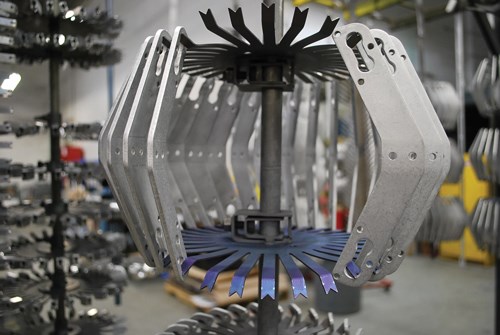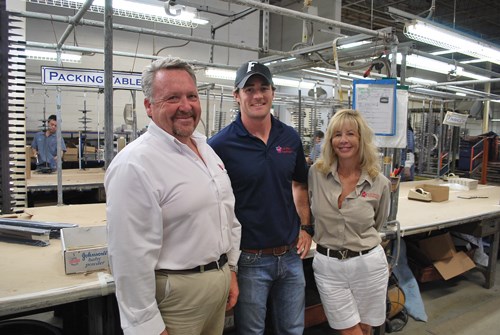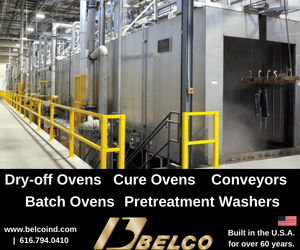A.M. Metal Finishing Meets The Lockheed Standard
Orlando plating shop one of 70 to make Lockheed Martin’s Preferred Supplier list from 2,000 vendors
Rick Hunter doesn’t feel much like taking on the Chinese these days.
The owner of A.M. Metal Finishing in Orlando is just as happy dealing with the customer who recognizes the great work he and his staff perform when it comes to anodizing, powder coating, chromate conversion and electropolishing, among their other capabilities.
“I’m not going to compete with China when it comes to price,” says Hunter, who runs the business along with his wife, Sloane. “Our customers know that we have a high standard when we run parts here every day, and that often comes with a cost. Thankfully, we have a lot of customers who recognize that and want to pay for that level of service and expertise.”
That’s not to say Hunter doesn’t get hammered about his costs when some customers walk in the door, but he says that was the trade-off when he committed A.M. Metal Finishing to the level of quality it is known for in the aerospace industry throughout Florida and the southern U.S.
“I’ll have a guy tell me that I’m twice the price he is getting at other mom and pop shops, but then I show him that my black dye is five times the cost they are getting quoted at other places,” Hunter says. “They can always go cheaper, but down the road they are going to wonder why their parts are fading.”
PREFERRED PARTNER
It’s Hunter’s level of commitment—as well as that of his entire staff at A.M. Metal Finishing—that earned the company a distinguished award from one of the premier aerospace manufacturers in the U.S. Lockheed Martin recently elevated the finisher to its Preferred Supplier status.
According to Hunter, only about 70 of Lockheed Martin’s more than 2,000 suppliers have received this distinction, which is earned by having 100 percent on-time deliveries and a 100-percent quality rating for 12 consecutive months.
“It isn’t easy to get,” says Hunter, who has worked with Lockheed Martin for 29 years.
Lockheed had A.M. Metal Finishing undergo its Suppliers Assessment Survey, which had the shop look at every aspect of its operation, and maintain an approved quality system and validated process controls.
The Lockheed program says it “diligently monitors supplier performance; suppliers must consistently perform and meet the delivery and quality scores.” Failure to do so means that “performance issues will be investigated and continued performance below program criteria may result in a warning letter or removal from the PSP program.”
Status OPENs DOORS
Winning the award puts A.M. Metal Finishing in rarified air, but it also gives it an opportunity to work with other companies in the aerospace industry who recognize the shop’s level of quality.
But an even bigger advantage than exposure to other Lockheed Martin vendors is the opportunity to work closely with the defense contractor’s engineers and quality control specialists to help Hunter improve his company’s efficiencies and performance standards.
One of the byproducts of that partnership is being accepted into Lockheed Martin’s Supplier Collaboration and Development Program (SCD), a supplier management training program through which Lockheed’s managers work closely with A.M. Metal Finishing managers on ways to improve the shop’s performance.
Lockheed says its SCD teams work directly with its suppliers to analyze and transform manufacturing and finishing operations in order to reduce lead times and risk, improve affordability, and ensure a seamless manufacturing flow. This, in turn, delivers maximum value and affordability.
Lockheed’s quality control managers look at specific processes at A.M. Metal Finishing and study them to make sure the right materials are provided at the right location, that they are on time, and that they come in at the best possible price, with a strategic focus on reducing or eliminating non-value-added processing.
MANAGEMENT MEETINGS
Hunter and Lockheed managers regularly meet with his management and operations staff to conduct process mapping in order to identify risk reduction opportunities, and to also look for financial savings. Lockheed teams also undertake data analysis to ensure the greatest return on its investment as well as assist A.M. Metal Finishing with the actual implementation of solutions that have been identified by the team.
A.M. Metal Finishing staff meet once a week to discuss improvements and programs, and then conference with their Lockheed Martin counterparts twice a month to discuss any ongoing issues and improvement processes.
“The biggest benefit to us is having access to these experts at Lockheed,” Hunter says. “We can go to seminars and training events, but to be able to tap into all their knowledge on a routine basis is fantastic for our operations.”
One of the items that Lockheed helped Hunter with was a payment incentive program for his customers. A.M. Metal Finishing was able to set up the program successfully, and his payments are coming quicker.
“The best thing is that Lockheed has the statistics, and they can show you which programs work and which don’t,” he says.
That’s not to say Hunter and A.M. Metal Finishing are novices at the finishing industry. Far from it, in fact.
BEST OF BUSINESS AWARD
In 2009, the Small Business Commerce Association gave A.M. Metal Finishing its Best of Business Award in the plating or formed products category.
The Manufacturers Association of Central Florida honored the company as the Small Manufacturer of the Year for 2008, and also gave the shop an award for exceptional growth in 2001.
Hunter credits much of that success to an outstanding trained staff led by quality managers John Mougenel and Ken Trenholm. The company’s 16-foot tanks are capable of anodizing Type II and Type III, as well as chromate conversion. It also has a 20-foot booth used for abrasive blasting and powder coating.
The company’s full capabilities include color, architectural and hardcoat anodizing, both in bulk and rack chromate conversion; electropolishing; passivation; turco cleaning; Teflon and nylon coating; salt spray and humidity testing; black oxide; electroless nickel; wet paint; selective masking and dry film lubricant.
In addition to Lockheed Martin, A.M. Metal Finishing also counts Northrop Grumman, NASA and nearby Walt Disney World as some of its prime customers.
Which means in a typical day, the parts you can find in Hunter’s shop may include bullets for military subs, metal toilets for NASA, anodized Harry Potter wands sold at local Orlando tourist spots, restrictor plates for NASCAR vehicles, or bleachers for the Splash Zone at Sea World.
600 CLIENTS TO SERVE
All totaled, A.M. Metal Finishing has about 600 clients whose orders range from hundreds of thousands of parts per year to just a handful.
That diversity helped Hunter’s company weather the recent recession and brought sales to $2.5 million in 2011, which was a 10 percent jump from the previous year.
“One of the biggest benefits of working with a company like Lockheed is that all of our other customers get that same quality of service we give to a big company,” Hunter says. “We don’t run parts separately, so we are running all parts at Lockheed standards, and that is the quality all our customers receive.”
For more information on A.M. Metal Finishing, please call 888-663-6136 or visit ammetal.com.
Related Content
Hubbard-Hall Acquires BioConversion Technology
The acquisition adds experience and biologics to the AquaPure product line.
Read MoreNASF/AESF Foundation Research Project #120: Electrochemical Destruction of Perfluorooctanesulfonate in Electroplating Wastewaters - April 2022-March 2023
This NASF-AESF Foundation research project report covers project work from April 2022 to March 2023 at the University of Illinois at Chicago. The overall objective of this work is to utilize a cost-effective reactive electrochemical membrane (REM) for the removal of PFAS from synthetic electroplating wastewater. Initial results for the oxidation of PFOA with three different catalysts are discussed.
Read MoreNASF/AESF Foundation Research Project #122: Electrochemical Approaches to Treatment of PFAS in Plating Wastewater - 7th Quarterly Report
The NASF-AESF Foundation Research Board has selected a project on addressing the problem of PFAS and related chemicals in plating wastewater streams, studying PFAS destruction via electrooxidation and electrocoagulation. Our last report described the results from experiments of EO with a Magnéli phase Ti4O7 anode on the degradation of eight perfluoroalkyl acids (PFAAs). In this seven quarter report, we describe work to further explore how the degradation of different PFAAs are related to their molecular structures.
Read MoreNASF/AESF Foundation Research Project #122: Electrochemical Approaches to Treatment of PFAS in Plating Wastewater - 10th Quarterly Report
The NASF-AESF Foundation Research Board selected a project addressing the problem of PFAS and related chemicals in plating wastewater streams. This report covers the 10th quarter of work (April-June 2023). Here, we examine the effect of surface fluorination of Ti4O7 anodes on PFAS degradation performance in terms of energy performance as well as formation of chlorate and perchlorate when chloride is present in the solution. The full paper on this work can be accessed and printed at short.pfonline.com/NASF24Feb2.
Read MoreRead Next
Delivering Increased Benefits to Greenhouse Films
Baystar's Borstar technology is helping customers deliver better, more reliable production methods to greenhouse agriculture.
Read MoreEpisode 45: An Interview with Chandler Mancuso, MacDermid Envio Solutions
Chandler Mancuso, technical director with MacDermid Envio discusses updating your wastewater treatment system and implementing materials recycling solutions to increase efficiencies, control costs and reduce environmental impact.
Read More






















